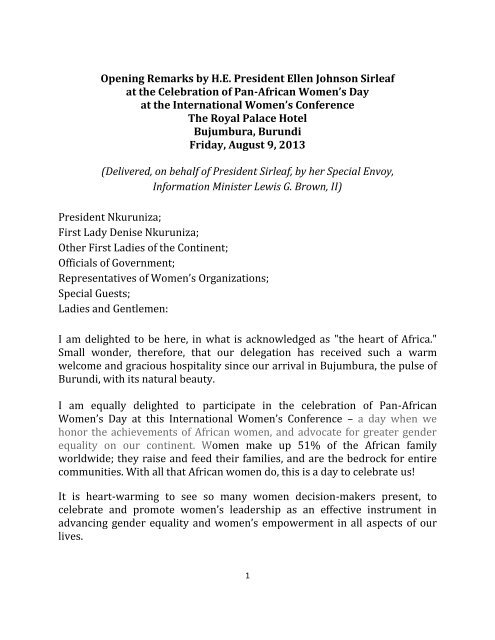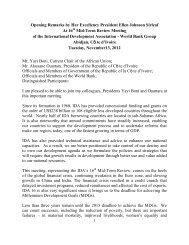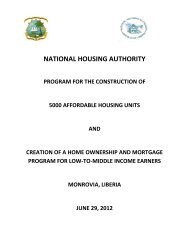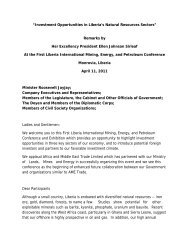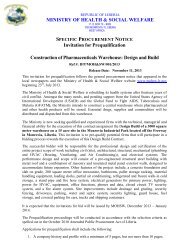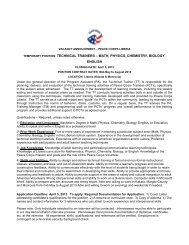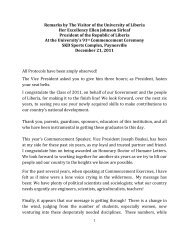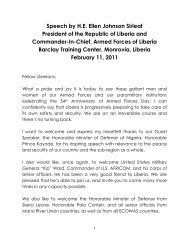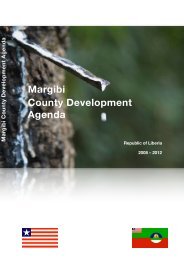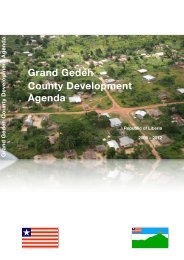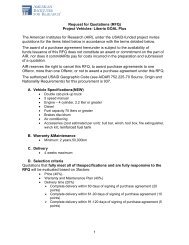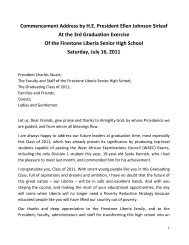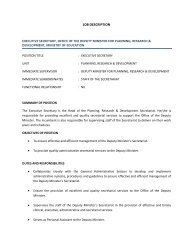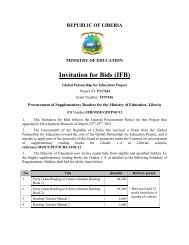Opening Remarks by H.E. President Sirleaf at the Celebration of ...
Opening Remarks by H.E. President Sirleaf at the Celebration of ...
Opening Remarks by H.E. President Sirleaf at the Celebration of ...
- No tags were found...
You also want an ePaper? Increase the reach of your titles
YUMPU automatically turns print PDFs into web optimized ePapers that Google loves.
<strong>Opening</strong> <strong>Remarks</strong> <strong>by</strong> H.E. <strong>President</strong> Ellen Johnson <strong>Sirleaf</strong><strong>at</strong> <strong>the</strong> Celebr<strong>at</strong>ion <strong>of</strong> Pan-African Women’s Day<strong>at</strong> <strong>the</strong> Intern<strong>at</strong>ional Women’s ConferenceThe Royal Palace HotelBujumbura, BurundiFriday, August 9, 2013(Delivered, on behalf <strong>of</strong> <strong>President</strong> <strong>Sirleaf</strong>, <strong>by</strong> her Special Envoy,Inform<strong>at</strong>ion Minister Lewis G. Brown, II)<strong>President</strong> Nkuruniza;First Lady Denise Nkuruniza;O<strong>the</strong>r First Ladies <strong>of</strong> <strong>the</strong> Continent;Officials <strong>of</strong> Government;Represent<strong>at</strong>ives <strong>of</strong> Women’s Organiz<strong>at</strong>ions;Special Guests;Ladies and Gentlemen:I am delighted to be here, in wh<strong>at</strong> is acknowledged as "<strong>the</strong> heart <strong>of</strong> Africa."Small wonder, <strong>the</strong>refore, th<strong>at</strong> our deleg<strong>at</strong>ion has received such a warmwelcome and gracious hospitality since our arrival in Bujumbura, <strong>the</strong> pulse <strong>of</strong>Burundi, with its n<strong>at</strong>ural beauty.I am equally delighted to particip<strong>at</strong>e in <strong>the</strong> celebr<strong>at</strong>ion <strong>of</strong> Pan-AfricanWomen’s Day <strong>at</strong> this Intern<strong>at</strong>ional Women’s Conference – a day when wehonor <strong>the</strong> achievements <strong>of</strong> African women, and advoc<strong>at</strong>e for gre<strong>at</strong>er genderequality on our continent. Women make up 51% <strong>of</strong> <strong>the</strong> African familyworldwide; <strong>the</strong>y raise and feed <strong>the</strong>ir families, and are <strong>the</strong> bedrock for entirecommunities. With all th<strong>at</strong> African women do, this is a day to celebr<strong>at</strong>e us!It is heart-warming to see so many women decision-makers present, tocelebr<strong>at</strong>e and promote women’s leadership as an effective instrument inadvancing gender equality and women’s empowerment in all aspects <strong>of</strong> ourlives.1
We are here, today, thanks to <strong>the</strong> vision and foresight <strong>of</strong> <strong>the</strong> founders <strong>of</strong> <strong>the</strong>Pan- African Women's Organis<strong>at</strong>ion (PAWO), who established it in 1962 – afull year before <strong>the</strong> Organiz<strong>at</strong>ion <strong>of</strong> African Union – to bring toge<strong>the</strong>r Africanwomen’s organiz<strong>at</strong>ions in a single pl<strong>at</strong>form to get to know each o<strong>the</strong>r better,to share best practices, and for joint action to promote human rights andgender equality.At a program, in May, to mark <strong>the</strong> 50 th anniversary <strong>of</strong> PAWO, I was honored,along with o<strong>the</strong>r distinguished women leaders <strong>of</strong> Africa, to receive <strong>the</strong> 2013Year <strong>of</strong> Pan-Africanism and African Renaissance African Union Award forPan-African service. I used <strong>the</strong> occasion to urge women <strong>of</strong> <strong>the</strong> continent tounite for more leadership roles, while acknowledging <strong>the</strong> difficult task to be<strong>the</strong> first female <strong>President</strong> on <strong>the</strong> continent, <strong>the</strong> first post-conflict woman<strong>President</strong> and a Nobel Laure<strong>at</strong>e <strong>President</strong>.Dear Friends:As we celebr<strong>at</strong>e Pan-African Women’s Day, allow me to use this pl<strong>at</strong>form tocomment on <strong>the</strong> indispensability <strong>of</strong> women to Africa’s development, be it in<strong>the</strong> political, economic or social spheres.Politically, every woman here is aware <strong>of</strong> <strong>the</strong> difficulty we face in bringingwomen into political particip<strong>at</strong>ion – from <strong>the</strong> grassroots up to <strong>the</strong> highest<strong>of</strong>fice in <strong>the</strong> land. We are seeing some progress in African women’sparticip<strong>at</strong>ion in politics, although not <strong>at</strong> <strong>the</strong> levels we demand. Thankfully,Burundi is among <strong>the</strong> countries <strong>of</strong> this region th<strong>at</strong> have made women’s fullpolitical particip<strong>at</strong>ion a priority and a reality.D<strong>at</strong>a compiled <strong>by</strong> <strong>the</strong> Inter-Parliamentary Union on <strong>the</strong> basis <strong>of</strong> inform<strong>at</strong>ionprovided <strong>by</strong> N<strong>at</strong>ional Parliaments <strong>by</strong> 1 July 2013 show th<strong>at</strong> <strong>of</strong> 189 countriesclassified, 30 have over 30% <strong>of</strong> women.Rwanda tops <strong>the</strong> list worldwide, with 56.3% and 38.5% in its Lower andUpper Houses, respectively. The o<strong>the</strong>r eight African countries ranking high inwomen’s political particip<strong>at</strong>ion are: Seychelles, <strong>at</strong> 43.8%; Senegal, <strong>at</strong> 42.7%;2
South Africa, 42.3% and 32.1%; Mozambique, <strong>at</strong> 39.2%; Tanzania, 36.0%;Uganda, 35.0%; and Angola, 34.1%. Burundi, coming in <strong>at</strong> number 30, has30.5% women in its Lower House and 46.3% in its Upper House.These countries succeeded because <strong>the</strong>y recognized <strong>the</strong> importance <strong>of</strong> equitybetween women and men in decision-making and <strong>the</strong>y instituted changes in<strong>the</strong>ir electoral and parliamentary processes.My own country, regrettably, lags far behind, with a total <strong>of</strong> 13 women in ourN<strong>at</strong>ional Legisl<strong>at</strong>ure – 8 in <strong>the</strong> House and 5 in <strong>the</strong> Sen<strong>at</strong>e, totaling 8½% <strong>of</strong> <strong>at</strong>otal <strong>of</strong> 103 lawmakers. Just yesterday, our Women’s Legisl<strong>at</strong>ive Caucusintroduced a Parity Bill in <strong>the</strong> Plenary, which call for not less than 30% andnot more than 70% for both genders in our Legisl<strong>at</strong>ure. Clearly, we have workto do in getting this Bill enacted into law.It goes without saying th<strong>at</strong> when women are represented in gre<strong>at</strong>er numbersin parliaments, as well as <strong>at</strong> <strong>the</strong> grassroots level, <strong>the</strong>ir perspectives andinterests are factored in, and <strong>the</strong>ir concerns are given higher priority. Genderequity in <strong>the</strong> corridors <strong>of</strong> power can and must happen in all corners <strong>of</strong> thisvast continent th<strong>at</strong> is our home.Where, Dear Sisters and Bro<strong>the</strong>rs, would Africa’s economy be but for <strong>the</strong>women who farm <strong>the</strong> land, and carry <strong>the</strong> w<strong>at</strong>er, and take <strong>the</strong> goods to market?They are <strong>the</strong> bedrock <strong>of</strong> our economy. The face <strong>of</strong> agriculture around <strong>the</strong>globe, and particularly in Africa, is <strong>of</strong>ten female.St<strong>at</strong>istics show th<strong>at</strong> African women comprise 70% <strong>of</strong> sub-Saharan Africanagricultural workers and 80% percent <strong>of</strong> those involved in <strong>the</strong> foodprocessing chain. Women toil in <strong>the</strong> fields th<strong>at</strong> provide nourishment andincome for <strong>the</strong>ir families. They contribute to commercial agriculture, whichincludes high value products such as fruits and vegetables, through <strong>the</strong>marketing <strong>of</strong> agricultural goods. Yet, more <strong>of</strong>ten than not, women’scontributions to <strong>the</strong> agricultural sector go unrecognized. In our part <strong>of</strong> <strong>the</strong>3
world, women own less than 1% <strong>of</strong> <strong>the</strong> land and benefit from only 1% <strong>of</strong>agriculture credit.Few small-scale women farmers are paid for <strong>the</strong>ir labor, and societal views <strong>of</strong>women’s roles restrict <strong>the</strong>ir inputs in household decisions. Such beliefs alsolimit <strong>the</strong>ir access to land ownership, farm equipment, and credit – all <strong>of</strong> whichare needed to be economically successful. These barriers ultim<strong>at</strong>ely inhibitwomen’s ability to produce, and can make it difficult for <strong>the</strong>m to escapepoverty.To sustain <strong>the</strong> impressive economic growth which Africa has registered, wewill need to boost agricultural productivity. In order to do so, Africa will needits women – who constitute half <strong>of</strong> its 1 billion popul<strong>at</strong>ion, with over 853million <strong>of</strong> <strong>the</strong>m in sub-Saharan Africa alone. In o<strong>the</strong>r words, Africa must placea stronger focus on women <strong>at</strong> all levels <strong>of</strong> <strong>the</strong> agricultural value chain.If our continent is to progress, <strong>the</strong>re must be parity for its women in <strong>the</strong>iraccess to land, finance, agricultural inputs and technology. Were th<strong>at</strong> to occur,it is estim<strong>at</strong>ed th<strong>at</strong> agricultural outputs in Africa would increase <strong>by</strong> up to 20%– one-fifth above current levels. We must overcome societal and o<strong>the</strong>r taboosth<strong>at</strong> restrict women’s full particip<strong>at</strong>ion in Africa’s development.On <strong>the</strong> social level, Africa faces many challenges, all <strong>of</strong> <strong>the</strong>m highlighted in <strong>the</strong>Millennium Development Goals – <strong>of</strong> poverty, high illiteracy, sexual violence,high infant and m<strong>at</strong>ernal mortality r<strong>at</strong>es, HIV/AIDS, <strong>the</strong> effects <strong>of</strong> clim<strong>at</strong>echange. In addressing any and all <strong>of</strong> <strong>the</strong>se challenges, <strong>the</strong> full particip<strong>at</strong>ion <strong>of</strong>women is paramount; we must harness <strong>the</strong> potential <strong>of</strong> one-half <strong>of</strong> <strong>the</strong>continent’s popul<strong>at</strong>ion – its women.I had <strong>the</strong> honor to co-chair <strong>the</strong> UN Secretary-General’s High-Level Panel on <strong>the</strong>Post-2015 Development Agenda, to serve as a successor to <strong>the</strong> MDGs. TheReport we submitted <strong>at</strong> <strong>the</strong> end <strong>of</strong> May drew upon <strong>the</strong> opinions <strong>of</strong> peoplearound <strong>the</strong> world, through a very rigorous consult<strong>at</strong>ive process th<strong>at</strong> wasglobal, people-centered and planet-sensitive to address common challenges <strong>of</strong>4
economic growth, social inclusion and environmental sustainability. At <strong>the</strong>same time, we all agreed th<strong>at</strong> <strong>the</strong> intern<strong>at</strong>ional community should continue towork towards achieving <strong>the</strong> MDGs and to carry <strong>the</strong>m forward after 2015.Despite significant gains, much remains to be done about <strong>the</strong> place <strong>of</strong> womenin African society. Africa’s future as an engine <strong>of</strong> global economic growth willbe directly linked to <strong>the</strong> st<strong>at</strong>us <strong>of</strong> women on <strong>the</strong> continent. For in <strong>the</strong> long run,this continent will rise when women take roles as educ<strong>at</strong>ed and equalpartners in society. There is no doubt th<strong>at</strong> women are <strong>the</strong> future <strong>of</strong> Africa, andits leaders must invest in women’s development if <strong>the</strong>y want <strong>the</strong>ir country,and our continent, to advance in <strong>the</strong> 21 st century and beyond.We must spearhead efforts to promote gender equity and to advance andempower women. But getting to where we want to be will require <strong>the</strong>fundamental altering <strong>of</strong> <strong>the</strong> mindset and <strong>at</strong>titudes <strong>of</strong> a society th<strong>at</strong>marginalizes women, and to make <strong>the</strong> particip<strong>at</strong>ion <strong>of</strong> women inclusive in allendeavors.Africa’s history is replete with incidences <strong>of</strong> <strong>the</strong> marginaliz<strong>at</strong>ion and exclusion<strong>of</strong> women. Th<strong>at</strong> history likewise shows <strong>the</strong> incredible potential <strong>of</strong> women topersevere, to lead, to resolve conflict, and to move a country from chaos onto<strong>the</strong> p<strong>at</strong>h <strong>of</strong> socio-economic development.We applaud <strong>the</strong> efforts <strong>of</strong> everyone involved in commemor<strong>at</strong>ing this Pan-African Women’s Day, bringing toge<strong>the</strong>r people from all over Africa, andbeyond. We wish for PAWO ano<strong>the</strong>r fifty years <strong>of</strong> continued success.5


